As a parent, it's important to understand the essential duties of a Board Certified Behavior Analyst (BCBA). These professionals:
Each of these responsibilities plays a crucial role in effective ABA therapy. They help ensure that interventions are tailored to your child's unique needs, promote caregiver involvement, and enhance the overall support for children facing behavioral challenges.
Let’s explore this together! Knowing what a BCBA does can empower you to be an active participant in your child's journey. By working closely with BCBAs, you can foster a supportive environment that truly makes a difference. Remember, you're not alone in this—many parents share similar experiences and challenges, and together we can navigate them successfully!
Understanding the responsibilities of Board Certified Behavior Analysts (BCBAs) can really make a difference in your child's therapeutic journey. Yet, many parents aren't fully aware of the essential duties these professionals take on. Let’s dive into the critical roles BCBAs play in:
So, what happens when parents are equipped with this knowledge? The answer is clear: active involvement can lead to profound benefits, resulting in improved outcomes for children with autism. We’re here to help you every step of the way!
At Rori Care - ABA Therapy, we understand the challenges parents face, and we’re here to help! Our compassionate clinicians provide a comprehensive framework that empowers you every step of the way. By creating personalized plans tailored to your child's unique needs, strengths, and goals, we ensure that you are an essential part of your child’s therapeutic journey.
We focus on setting clear, measurable objectives for behavior modification and skill enhancement as part of our BCBA duties. This approach not only boosts the effectiveness of the treatment but also aligns with research showing that active caregiver involvement can significantly improve outcomes. In fact, studies reveal that children whose guardians are engaged in their therapy show greater progress in communication, social skills, and emotional regulation.
With our evidence-based strategies, continuous assessments, and adjustments, we provide you with the resources and knowledge needed to understand the BCBA duties required to effectively support your child’s behavioral goals. Rori’s commitment to fostering a collaborative atmosphere transforms the therapeutic experience into a shared journey of growth and success. Together, we can empower you to be an advocate for your child's development. Let’s explore this together!
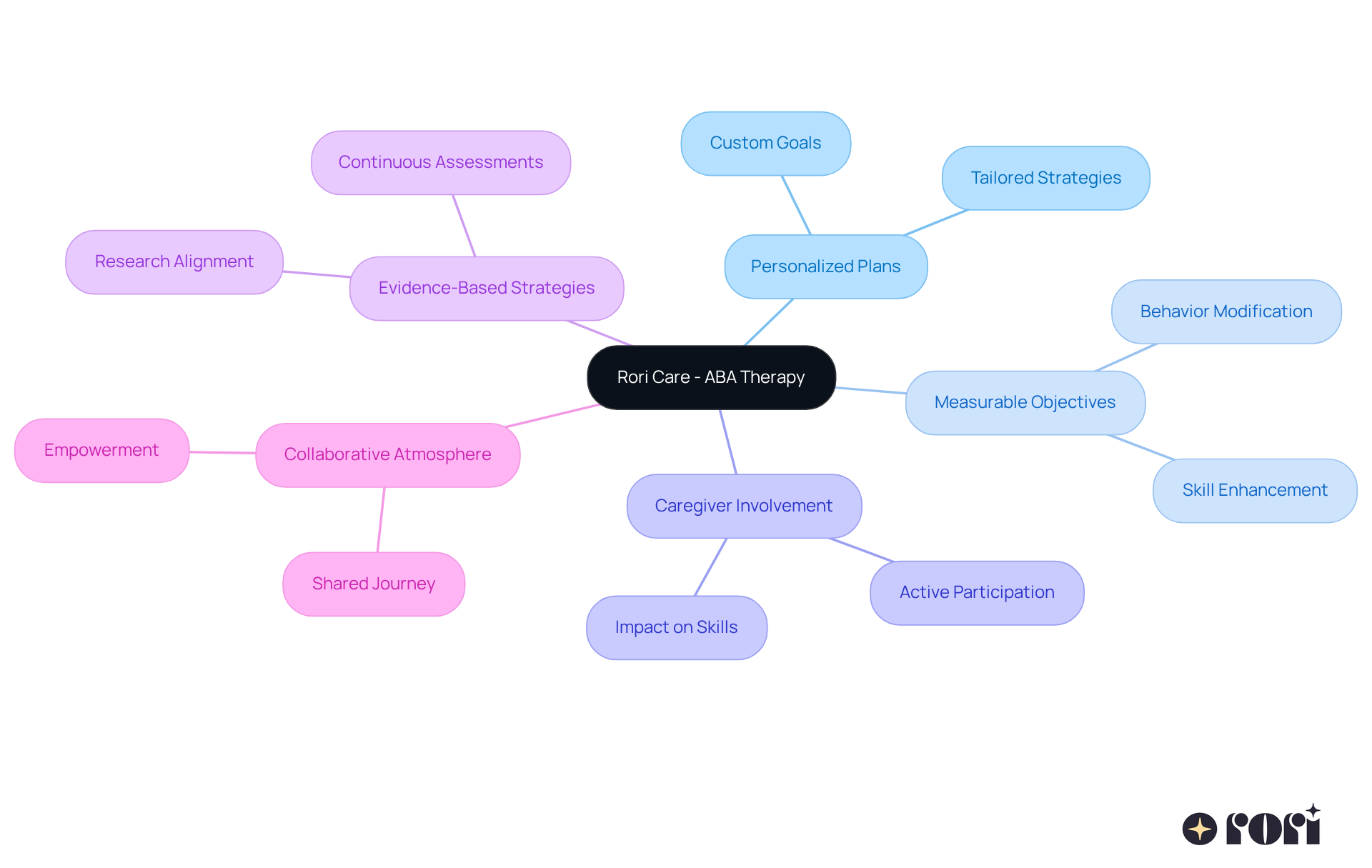
Behavior analysts are here to help! They conduct thorough evaluations to gather detailed information about your child's behaviors, skills, and preferences. This multifaceted approach often includes:
By truly understanding each child's unique profile, BCBAs can effectively perform their BCBA duties to create customized interventions that enhance learning and encourage positive behavior changes.
Current best practices highlight how essential these assessments are. They not only inform individualized treatment plans but also align with the latest trends in standardized testing for autism evaluations. Plus, automatic progress report creation is a key part of monitoring each student's development.
The importance of thorough assessments in ABA therapy is critical to fulfilling BCBA duties. They serve as the foundation for successful interventions and ongoing progress monitoring. Parents, we encourage you to actively engage with behavior analysts during the assessment process! Ask questions and share insights about your child's behavior at home—this can lead to even more effective interventions.
At Rori Care, we believe in equipping caregivers with ABA concepts and techniques. This promotes informed decision-making and enhances behavioral results, ultimately aiding your child's development. Let’s explore this together! We’re here to help you every step of the way!
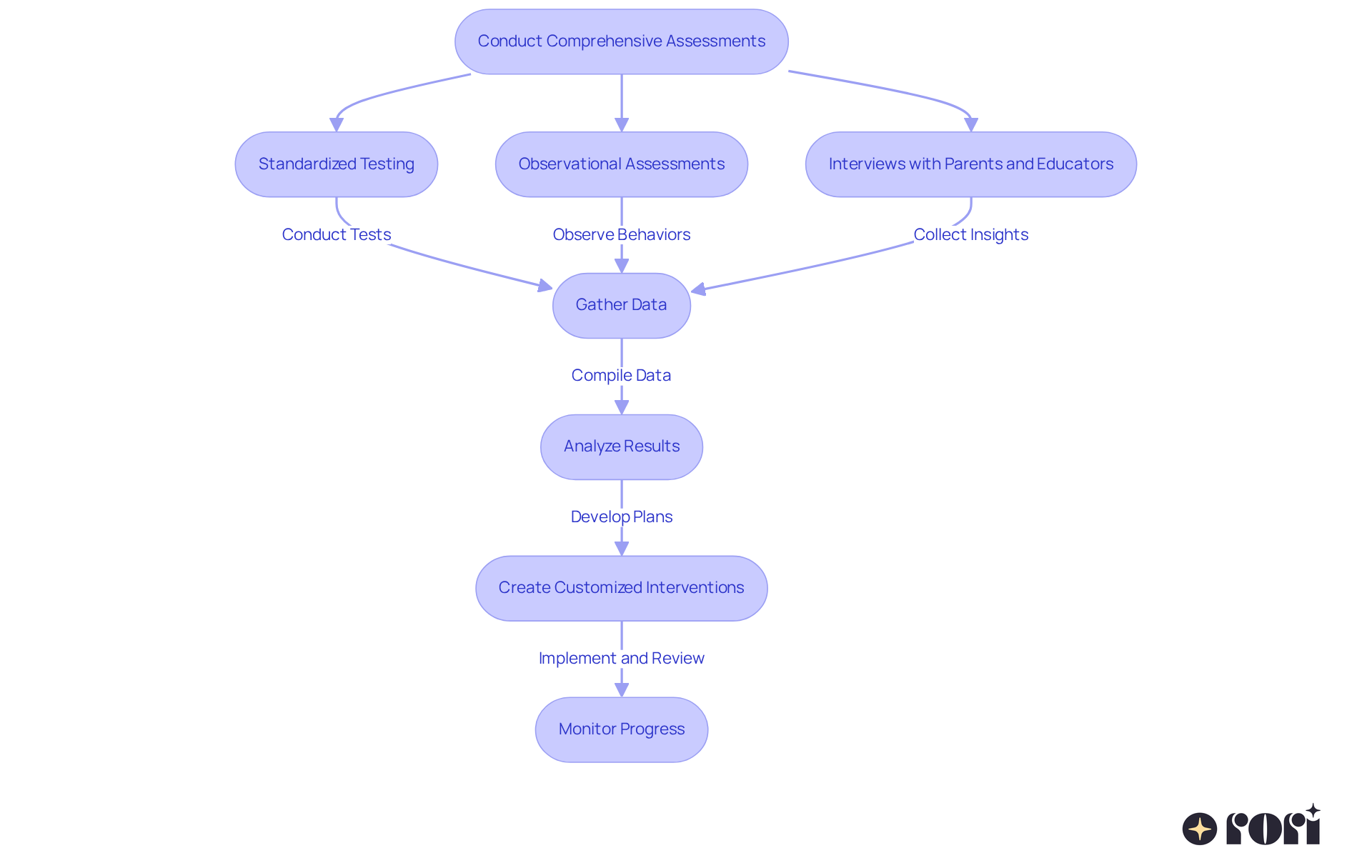
After thorough evaluations, the bcba duties include creating customized treatment plans that outline specific objectives and approaches tailored to each individual’s unique needs. Each behavioral plan reflects the individual's strengths, challenges, and goals, ensuring a personal touch. These plans are built on evidence-based practices, using strategies that have been shown to work for behavior change.
Measurable goals are established to provide clear benchmarks for progress, with regular updates—typically every 3 to 6 months—based on ongoing assessments and feedback from parents and caregivers. This continuous evaluation and modification process allows for necessary adjustments that cater to the individual's evolving needs, ultimately leading to better outcomes.
Interestingly, studies reveal that individuals with lower adaptive functioning levels at the start are more likely to see significant improvements in adaptive behavior through personalized interventions. This highlights just how important customization is in treatment plans. Behavior analysts emphasize that the success of these personalized approaches greatly depends on active family participation, which enhances the effectiveness of bcba duties across different settings.
Caregiver education plays a vital role in this journey, empowering caregivers with the knowledge and skills they need to effectively support their child’s behavioral goals. Let’s explore this together! We’re here to help you every step of the way!
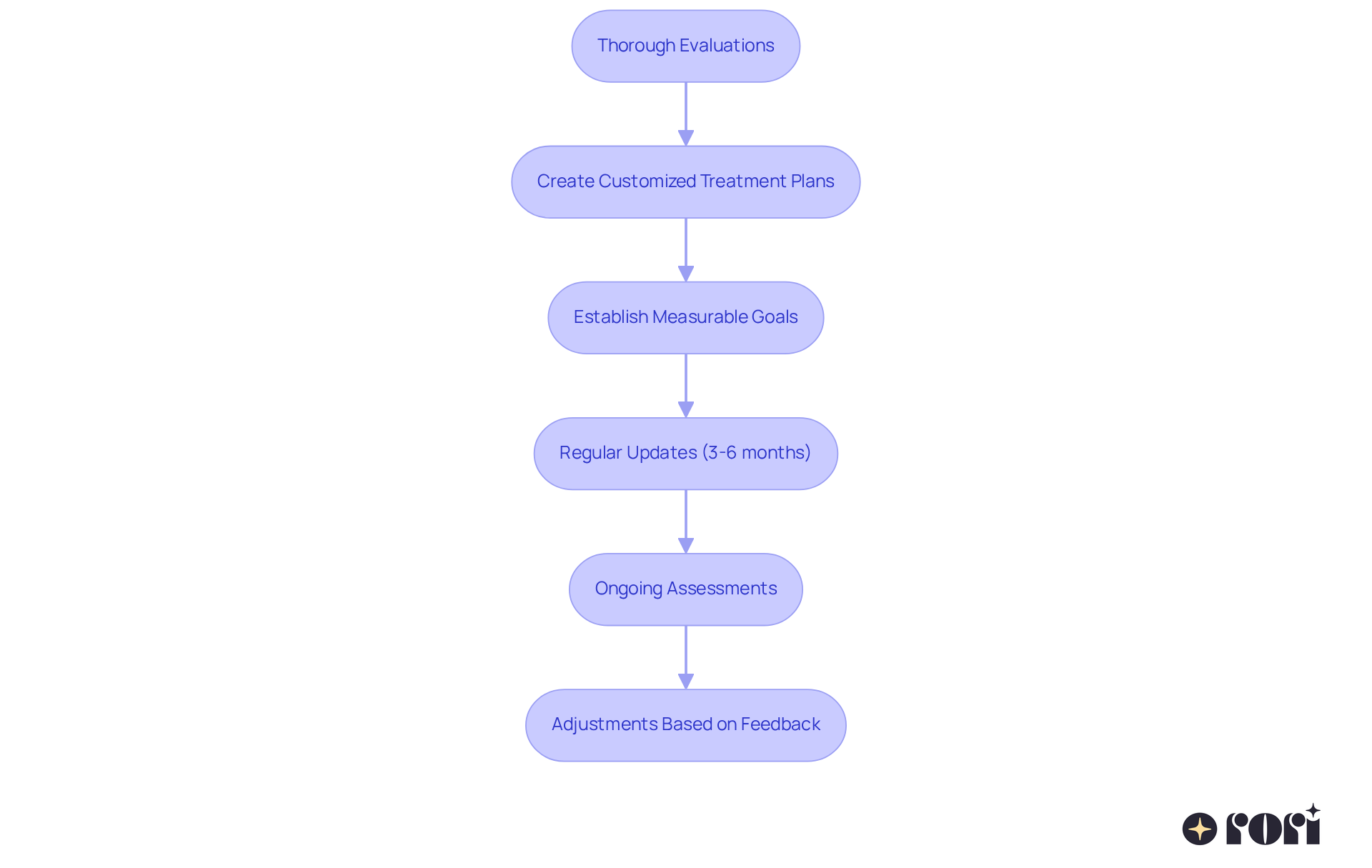
The bcba duties include training parents and caregivers, helping them develop essential skills to effectively implement ABA strategies at home. This training covers techniques for reinforcing positive behaviors, managing challenging situations, and promoting skill generalization across different settings. You might be surprised to learn that when caregivers actively engage in their child's treatment, a whopping 90% of individuals show significant improvement! This really highlights how important family participation is in behavior management.
By equipping caregivers with these skills, behavior analysts not only enhance the overall effectiveness of therapy but also create a supportive home environment that encourages continuous growth. After all, as a thoughtful saying goes, 'You can't pour from an empty cup.' This reminds us of the importance of caregiver well-being when supporting individuals with autism. Ultimately, the partnership between behavior analysts and families, which encompasses bcba duties, lays the groundwork for lasting improvements in children's behavior and development. Let’s explore this journey together!
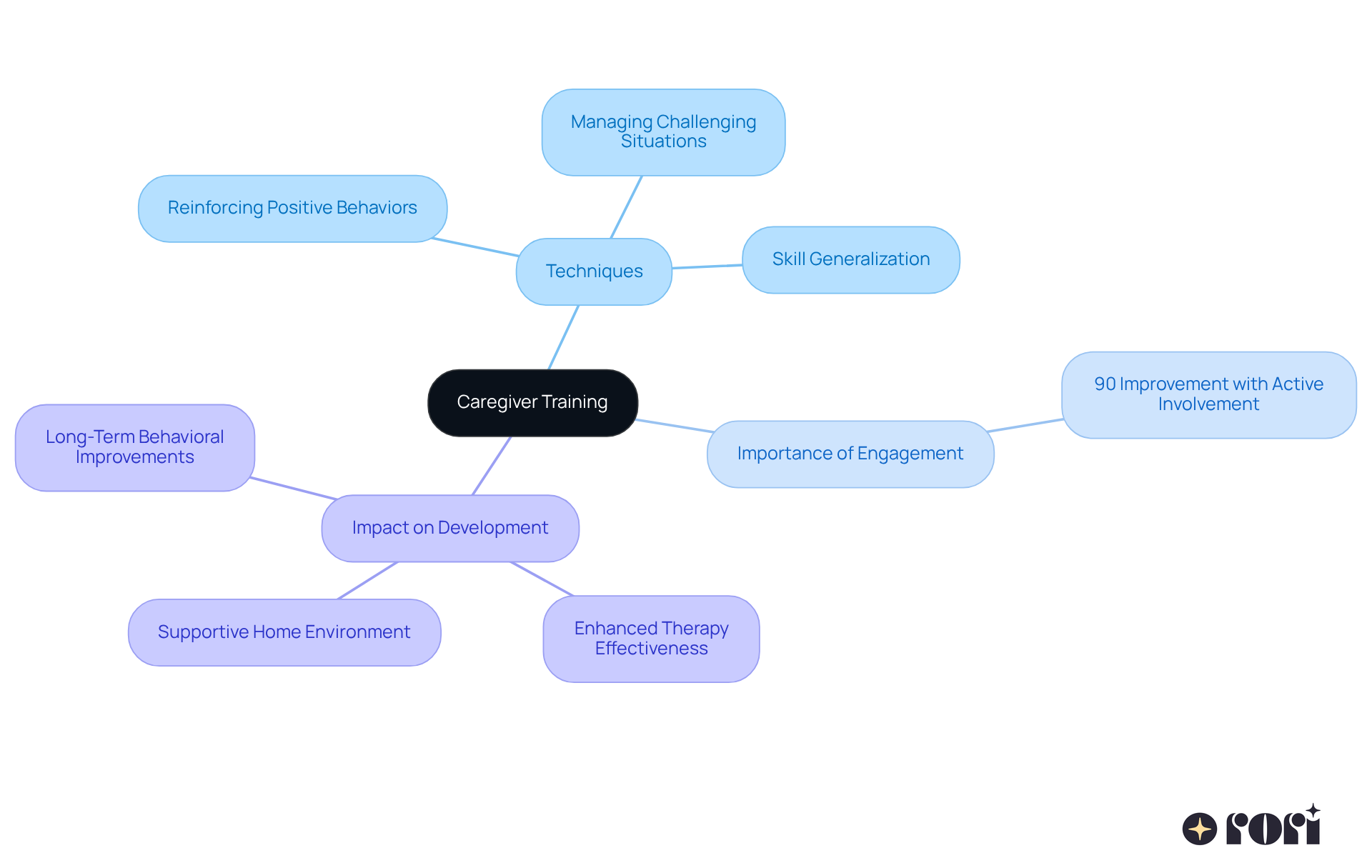
BCBAs are here to help with their bcba duties! They systematically collect and analyze data on a child's behavior, which is super important for evaluating how well interventions are working. Did you know that about 50% of ABA therapy time is often spent on writing reports? That's why integrating AI to automate progress report generation is such a game-changer! This data-driven approach supports bcba duties by allowing treatment plans to be adjusted promptly, ensuring strategies stay relevant and effective.
Regularly analyzing data not only helps us celebrate successes but also shines a light on areas that might need a bit more attention. Therapists use specific metrics, like frequency counts and duration measurements, to assess progress in communication, social interaction, and daily living skills. By sharing clear and detailed data with families, BCBAs perform their bcba duties to enhance transparency and build trust, creating a collaborative effort that strengthens the therapeutic process.
Plus, with the incorporation of automated functions in digital tools powered by advanced AI, data gathering and analysis become a breeze! This leads to immediate insights, facilitating quick modifications in treatment. Imagine, this automation can improve the efficiency of ABA therapy, allowing for up to 50% more time dedicated to direct treatment!
Ongoing professional development in data analysis methodologies helps practitioners maintain high standards in their practice, ultimately promoting meaningful behavioral change. So, let’s explore this together and see how we can support your child’s journey! We’re here to help you every step of the way!
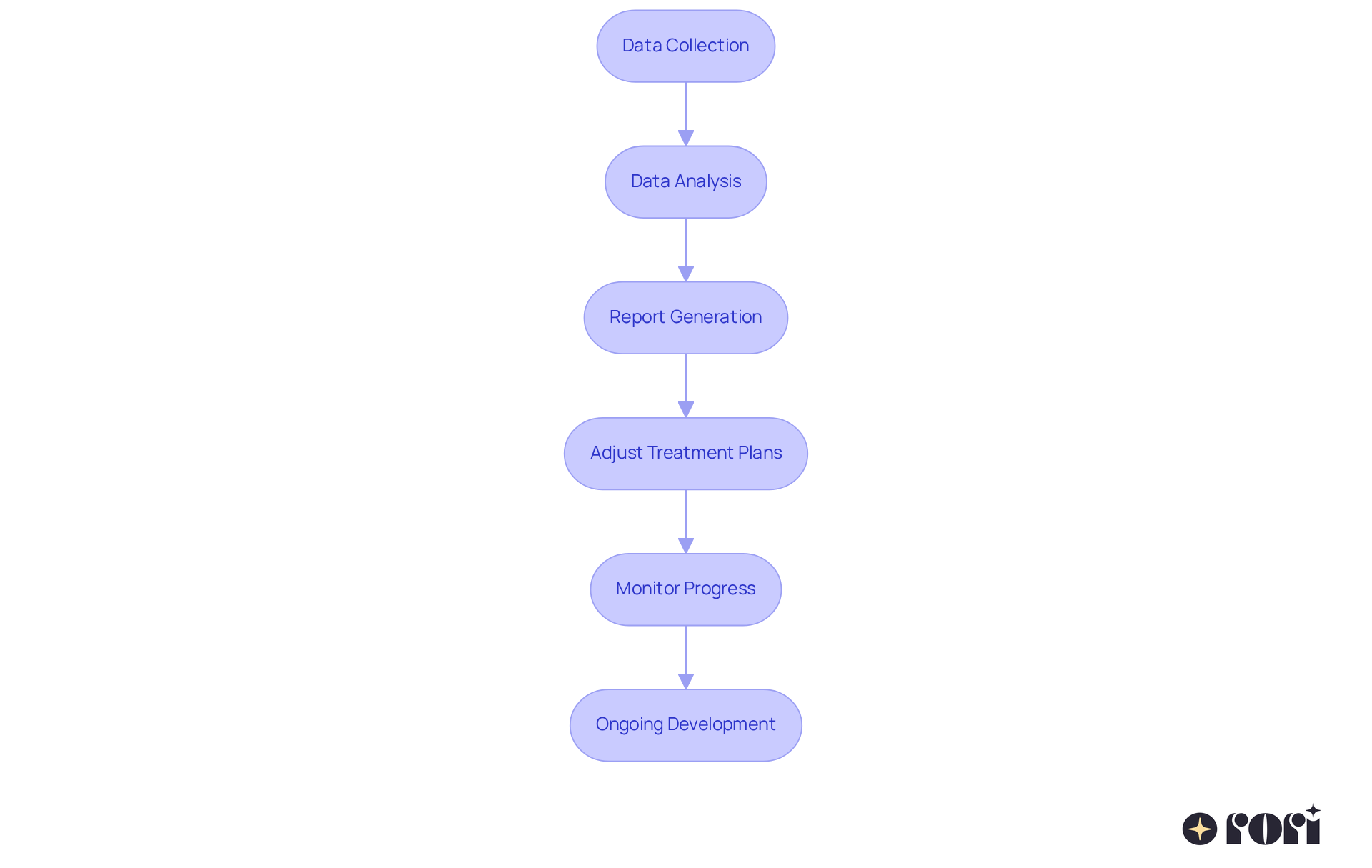
BCBAs fulfill their BCBA duties by working hand in hand with a variety of professionals, such as speech-language pathologists, occupational therapists, and educators, to provide well-rounded support for youth. This teamwork brings together different therapeutic techniques, which helps meet each young person's unique needs from multiple angles. Research shows that when these professionals collaborate, it leads to better treatment adherence and outcomes. Why? Because a cohesive treatment plan supports the child's overall development.
Effective communication among team members is key! It ensures that everyone is on the same page, reducing confusion for both clients and families. As one expert shared, 'When all providers work toward shared goals, interventions become more cohesive, leading to better treatment adherence and outcomes.' Another professional pointed out, 'Regular meetings and joint debriefings enable these experts to coordinate their approaches, ensuring consistency in intervention.' This commitment to collaboration not only boosts the effectiveness of ABA therapy but also empowers caregivers with the knowledge and tools they need to fulfill their BCBA duties in supporting their children's behavioral goals. Together, we can create an environment where children truly flourish. Let’s explore this together!
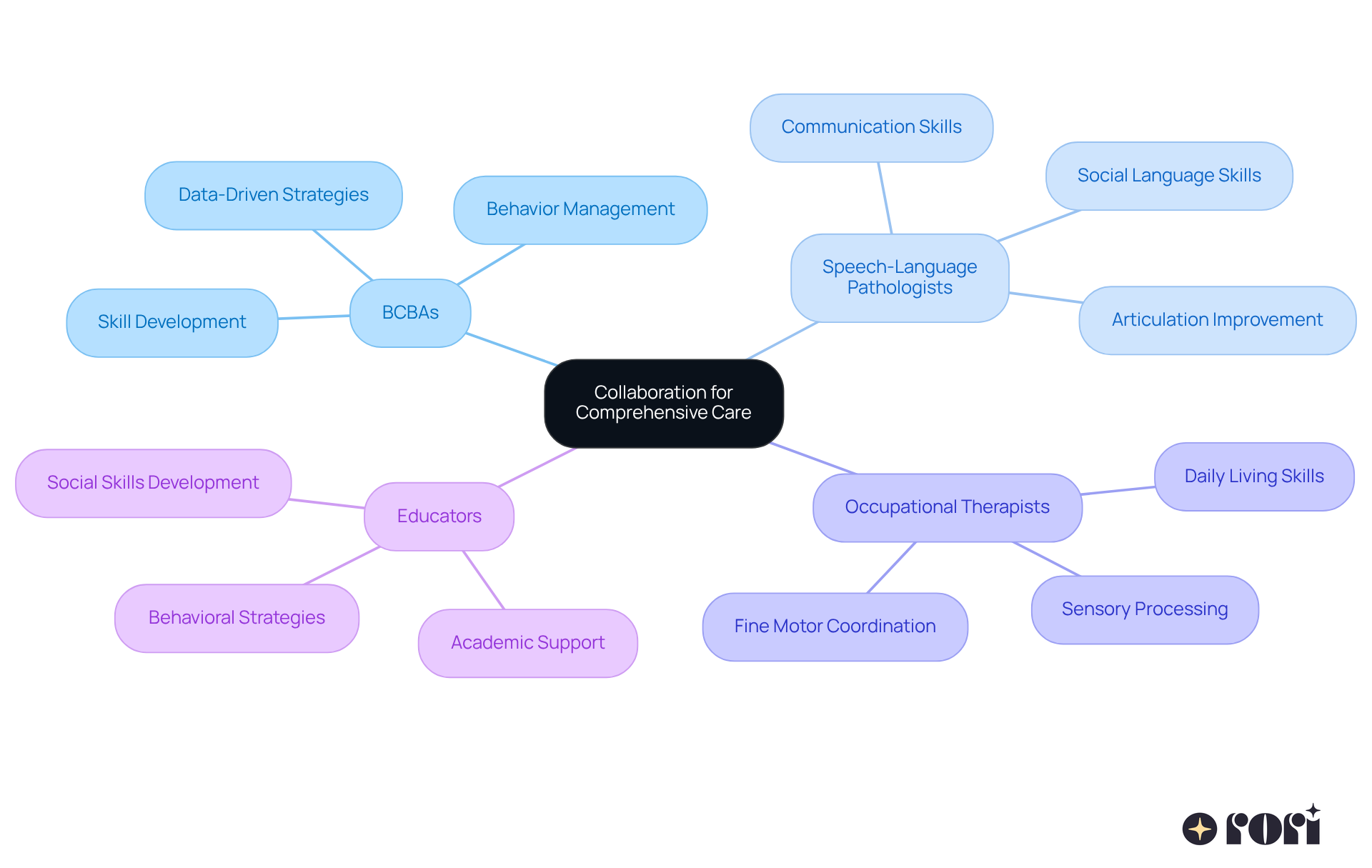
The duties of a BCBA include using evidence-based interventions that have been scientifically validated to promote positive behavior change. These methods can include:
A certified behavior analyst fulfills BCBA duties by creating personalized plans with measurable objectives and research-supported methods, ensuring continuous assessment and adjustments to meet each young person's unique needs.
By relying on proven techniques and leveraging AI to automate progress report creation, behavior analysts tackle the individual challenges that arise, leading to significant progress while freeing up 50% more time for direct treatment. This approach not only enhances the effectiveness of ABA practices but also empowers caregivers with the knowledge and strategies they need to support their kids' behavioral goals. Let’s explore this together!
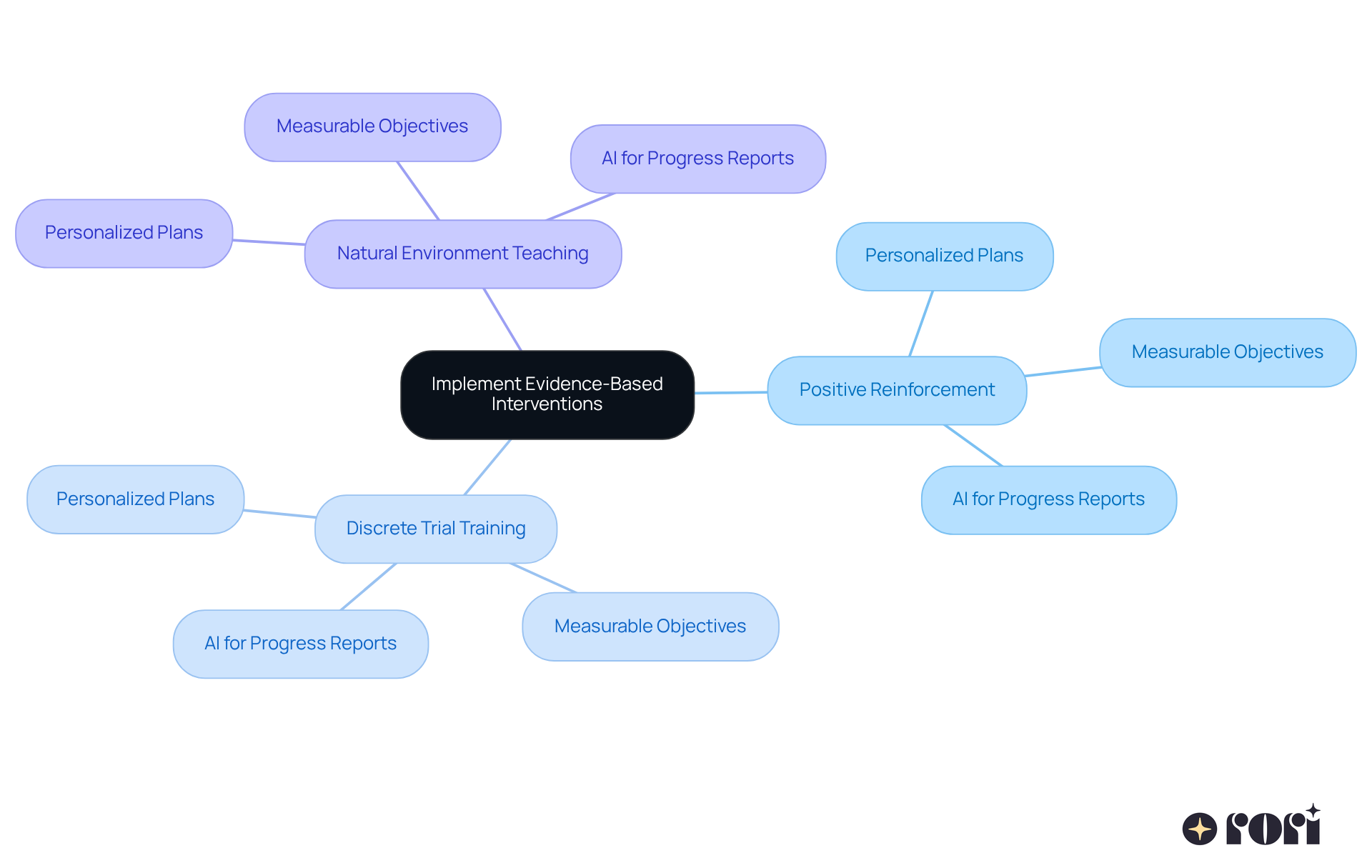
As Behavior Analysts, we really prioritize educating parents about the therapy process. We want you to understand the rationale behind interventions and the expected outcomes. This transparency helps build trust and encourages open communication between families and therapists.
When parents are involved in the learning process, it empowers them to support their child's development effectively and advocate for their needs. Improved caregiver training gives you a better grasp of ABA concepts and techniques, which leads to informed decision-making that positively influences your child's progress.
Active involvement in the therapeutic process often results in better behavioral outcomes. When caregivers align their support with professional interventions, it creates a more cohesive approach. This empowerment not only enhances the support for your child but also helps reduce stress and improve overall family dynamics. Ultimately, this benefits your child's therapeutic journey.
Let’s explore this together! We’re here to help you every step of the way!

Board Certified Behavior Analysts (BCBAs) are truly dedicated to continuous professional development. This commitment is essential for empowering caregivers with ABA principles and strategies. By attending workshops, conferences, and training sessions, they stay updated on the latest research and evidence-based practices in ABA therapy, including the exciting integration of AI technologies!
When BCBAs remain knowledgeable, they can provide the highest standard of care. They adapt their methods to meet the changing needs of their clients, helping them achieve their behavioral goals through active participation and data gathering. This ongoing education enriches children's everyday lives and promotes sustainable development, ensuring families have the tools they need to thrive.
At Rori Care, our clinical leadership group exemplifies this dedication. They emphasize the importance of neurodiversity in our approach to ABA treatment. Let’s explore this together! We’re here to help you every step of the way!
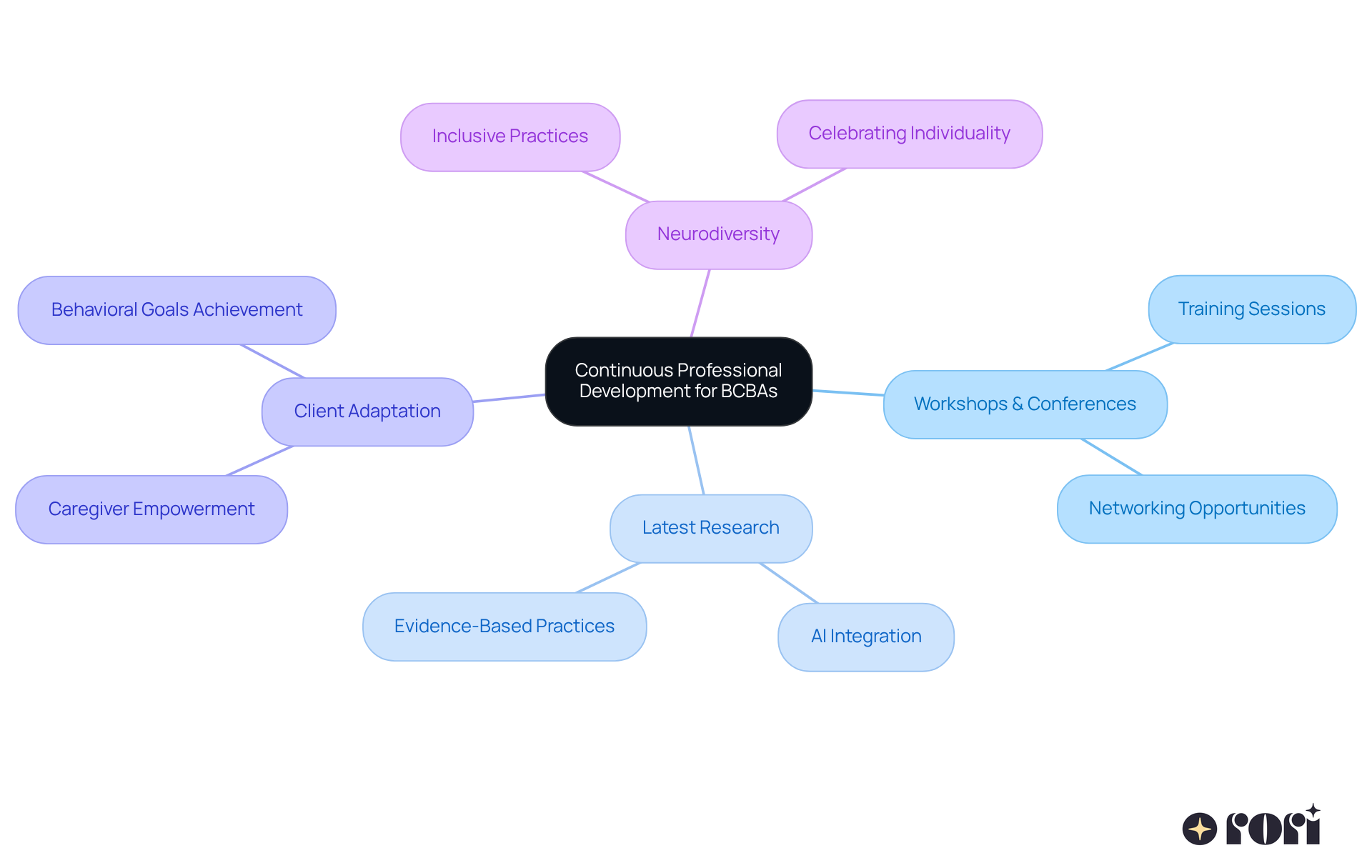
Behavior analysts play a crucial role in supporting their clients by helping them access important resources like educational materials, community support services, and funding opportunities for treatment. Their advocacy goes beyond individual clients; it's about raising awareness and understanding of ABA therapy in the wider community. By championing the needs of individuals with autism, BCBAs contribute to creating a more inclusive and supportive environment.
This is especially important when you consider that nearly 25% of school-age autistic youth are thriving in all developmental areas by age 10. It shows just how impactful effective interventions can be! But it's not just the children who feel the weight of these challenges. Families often carry a significant emotional burden, with about 50% of mothers of kids on the spectrum facing signs of depression. The BCBA duties include helping families navigate these challenges, ensuring that every individual has the chance to thrive.
Through caregiver education, families gain enhanced support and informed decision-making abilities, leading to better behavioral outcomes for their children. For instance, when caregivers learn specific ABA techniques, they can implement consistent interventions at home that align with their child’s therapy goals. Parents are encouraged to actively engage with their child's BCBA to explore available resources and support options tailored to their family's needs. This collaborative approach fosters child development and strengthens the family unit.
To make the most of caregiver education, consider scheduling regular check-ins to review BCBA duties with your BCBA. This way, you can review progress and adjust strategies as needed. Let’s explore this together! We’re here to help you every step of the way!
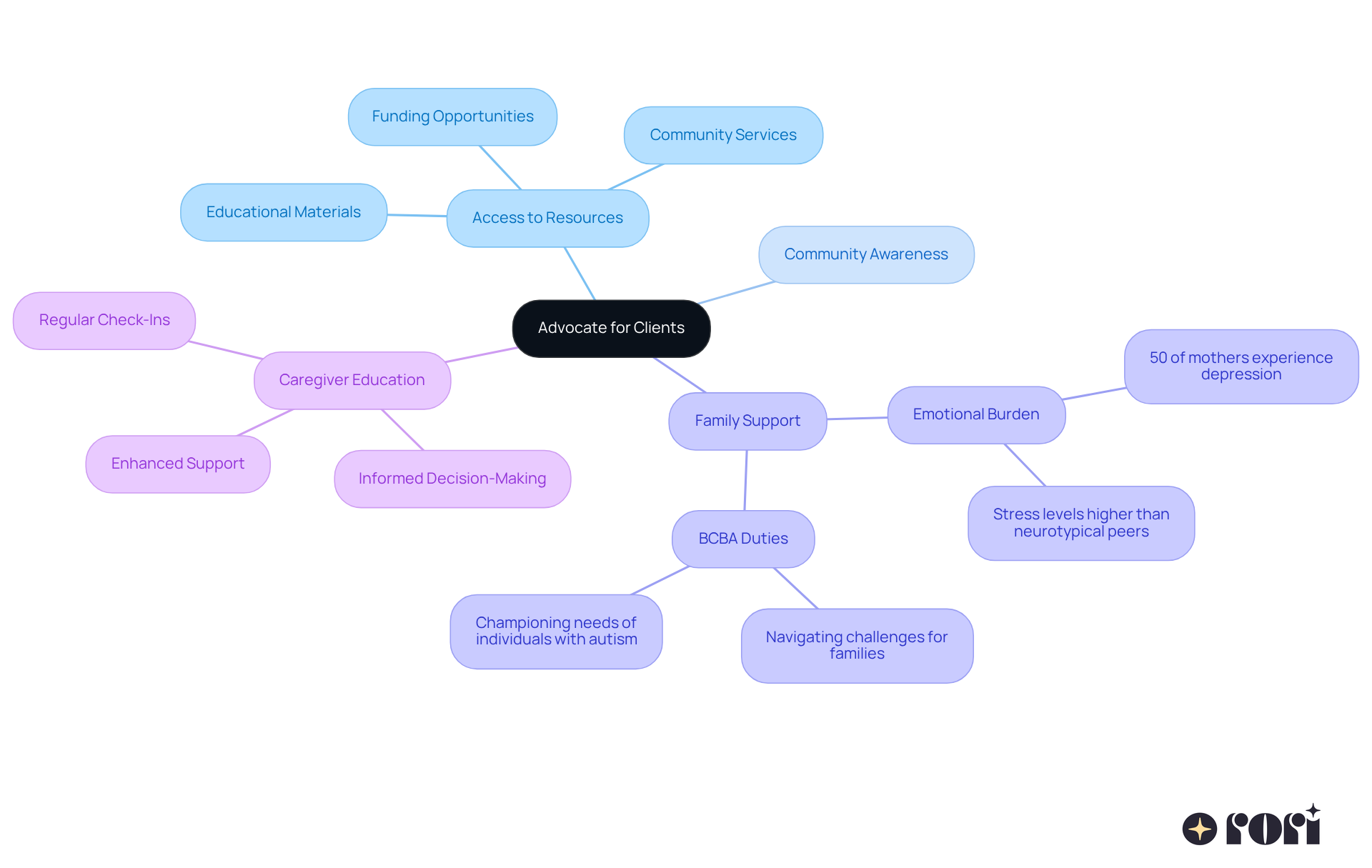
At Rori Care, we believe in the essential role that Board Certified Behavior Analysts (BCBAs) play in supporting children with autism and their families. Understanding what BCBAs do can truly empower parents to take an active role in their child's therapeutic journey. This collaboration not only makes interventions more effective but also creates a nurturing environment where children can thrive.
Let’s take a closer look at what BCBAs do! They conduct comprehensive assessments, create personalized treatment plans, train caregivers, and work alongside other professionals. Each of these responsibilities is aimed at ensuring that interventions are tailored to meet the unique needs of every child, ultimately leading to better outcomes. Plus, when parents actively participate in the therapy process, it significantly boosts the effectiveness of these interventions. That’s why it’s so important for families to engage with their BCBAs.
In wrapping up, embracing the duties of BCBAs can truly transform the therapeutic experience for both parents and children. By advocating for their child's needs, participating in training, and collaborating with professionals, families can cultivate a supportive environment that fosters development and growth. Staying engaged and informed is essential, as this partnership lays the groundwork for lasting positive change in their child's life. Together, with the support of Rori Care, families can navigate this journey with confidence and purpose. Let’s explore this together!
What is Rori Care - ABA Therapy?
Rori Care - ABA Therapy provides comprehensive support for parents and children through personalized plans tailored to each child's unique needs, strengths, and goals.
How does Rori Care involve parents in the therapeutic process?
Rori Care emphasizes active caregiver involvement, which has been shown to significantly improve outcomes in communication, social skills, and emotional regulation for children in therapy.
What types of assessments are conducted at Rori Care?
Comprehensive assessments include standardized testing, observational assessments, and interviews with parents and educators to gather detailed information about each child's behaviors, skills, and preferences.
Why are thorough assessments important in ABA therapy?
Thorough assessments inform individualized treatment plans and are critical for successful interventions and ongoing progress monitoring, ensuring that the unique needs of each child are met.
What does creating a personalized treatment plan involve?
Personalized treatment plans outline specific objectives and approaches tailored to each individual's strengths, challenges, and goals, built on evidence-based practices.
How often are treatment plans updated?
Treatment plans are typically updated every 3 to 6 months based on ongoing assessments and feedback from parents and caregivers to cater to the individual's evolving needs.
What role does caregiver education play in the therapy process?
Caregiver education empowers parents with the knowledge and skills necessary to effectively support their child's behavioral goals, enhancing the overall effectiveness of the therapy.
How does Rori Care ensure collaboration in the therapeutic journey?
Rori Care fosters a collaborative atmosphere, encouraging active engagement between parents and behavior analysts to enhance the therapeutic experience and promote shared growth and success.